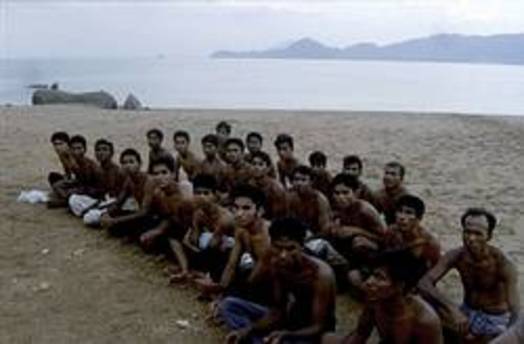
The last days of 2008 witnessed the humanitarian drama of Muslim minorities in southeastern Asia. A group of Muslims from Myanmar set out to Bay of Bengal with unfit boats to escape the oppression they had been subjected to in their country. About 1,000 refugees sailed in four or five boats and reached Bengal coasts. They landed at the Thai shore for fear of being seized by human traffickers at sea. Arrived at Thai port of Kota Ranong, the Rohingya refugees were detained by coast guard officials and were subjected to inhumane treatment. Thai security officials threatened the Rohingya men with beards to cut their bears and insulted them. The Thai government, which has been fighting Thai Muslims in Pattani Province for decades, refused to grant asylum to Myanmarese Muslims. The Rohingya refugees were set adrift at ocean with no food supply.
One of the boats with 193 refugees onboard got lost in the ocean and drifted for about a month until it reached Weh Island of Aceh Province. The rest of the boats are predicted to have been submerged by heavy monsoon rains. Acehnese officials extended help to the refugees who had been striving to survive at sea with no food and water. The Municipality of Sabang, Aceh Governorate, and a number of nongovernmental organizations, particularly the International Organization for Migration, offered help to Myanmarese Muslim refugees. The Rohingya asylum-seekers underwent health control and those whose condition was serious were dispatched to hospitals.
Journalists are not allowed to talk to the refugees, who were saved by relief aid of Indonesian government agencies and NOGs in Aceh. The Rohingya refugees refuse to go back to Myanmar for fear of being punished by Myanmarese junta administration, Indonesian officials said. All the refugees who could make it to Sabang port are men. Myanmarese authorities made a statement saying those refugees who arrived at Indonesian port are not Myanmarese citizens. Twenty-two of 220 Myanmarese Muslim refugees who set out to ocean with unsound fishing boats died before reaching Aceh. The refugees, including Thais and a Bangladeshi national, are staying at a navy guesthouse in the town of Idi, in western Aceh. The refugees strove to survive at sea with no food and water for three weeks. Twenty-two of them starved to death and their bodies were thrown into sea. Officials from the Indonesian Foreign Ministry stated they have initiated an investigation into the arrival of second refugee group. Muslim residents of Aceh, who know well what it means to be a refugee, immediately extended their help to the refugees and offered food and clothes.
Rahmad, a 37-year old refugee, said the Thai military gathered about 1,200 refugees on an uninhibited island and tortured them.
Indonesian Foreign Ministry warned the Rohingya asylum-seekers would be expatriated since they have no ratified refugee certificates, though the ministry's decision is not final. The problem of Myanmarese Muslim refugees that has been occupying the agenda of southeastern Asian countries will be discussed at a forum named the Bali Process. On the other hand, Din Syamsuddin, leader of Indonesia's second largest Muslim community Muhammadiyah, urged the Indonesian government to take the question of Myanmarese Muslims to the next ASEAN summit that will be held in late February, and seek a lasting solution to the problem. He indicated the Muhammadiyah organization would mobilize to help Myanmarese Muslims if the Indonesian government fails to extend adequate support and aid to the refugees.
Brad Adams, an official from the New York-based Human Rights Watch, highlighted the harsh treatment of the Myanmarese administration against the Rohingya Muslims was responsible for the problem.
Short History of Rohingya
Ethnic Rohingya Muslims are of Bengal, Burmese and Chinese origin. The Rohingya people, whose population is about 800,000 now, have been inhibiting western Myanmarese coastal region of Arakan since the seventh century. The junta administration of Myanmar refuses to recognize the Rohingya Muslims as a minority group. Rohingyas are subjected to political and religious pressure; they are not allowed to perform their religious rituals freely. Quran copies are burnt and religious schools are shut down.
Ekmeleddin İhsanoğlu, secretary general of the Organization of the Islamic Conference, expressed his concern over the situation of the Myanmarese Muslims. İhsanoğlu drew attention to the humanitarian tragedy of December, and criticized the Thai government for refusing entry to Arakanese Muslims fleeing the oppression of the Myanmarese government. He recalled the 1951 Refugee Convention adopted by the United Nations and accused Thailand of failing to abide by its obligations regarding refugees. İhsanoğlu urged the UN Refugee Agency (UNHCR) to set up an independent investigation team to investigate inhumane treatment of Arakanese Muslims, and to provide relief materials to at issue refugee groups.